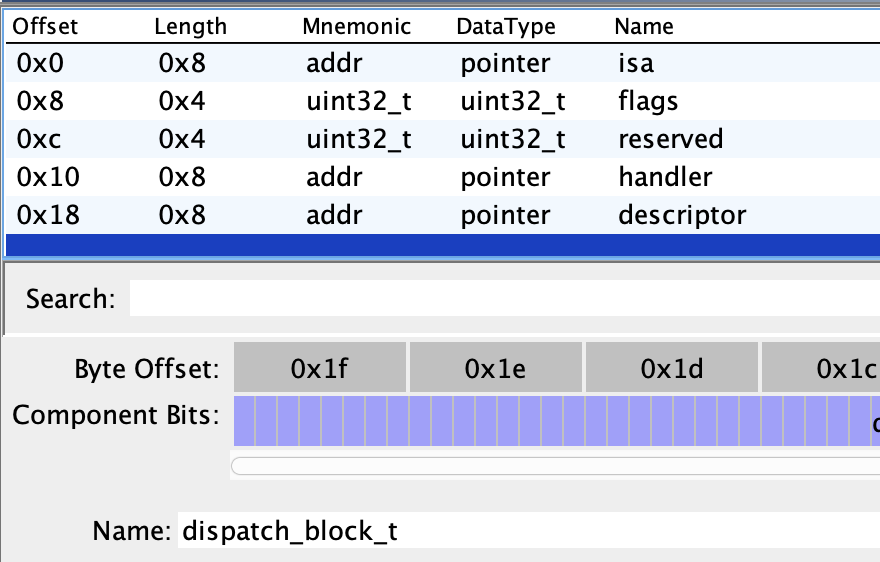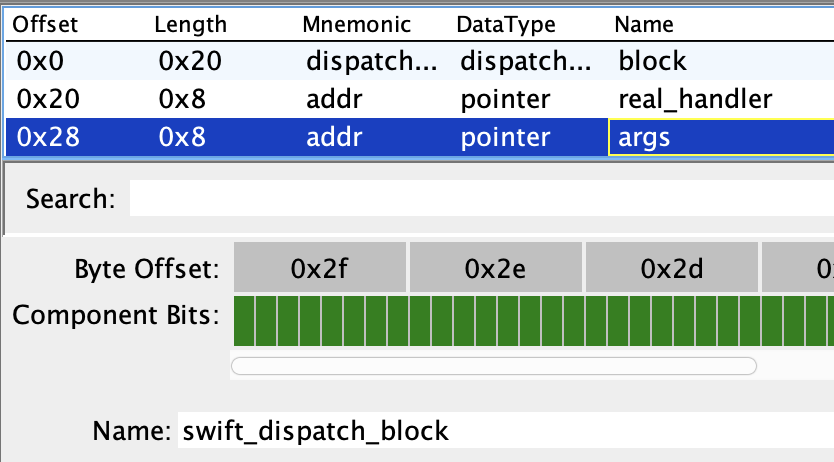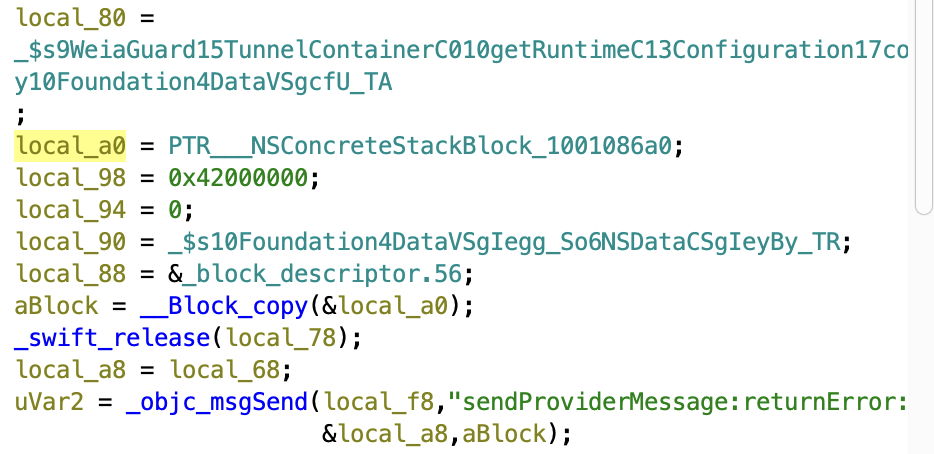13 KiB
macOS GCD - Grand Central Dispatch
{% hint style="success" %}
Learn & practice AWS Hacking: HackTricks Training AWS Red Team Expert (ARTE)
HackTricks Training AWS Red Team Expert (ARTE)
Learn & practice GCP Hacking:  HackTricks Training GCP Red Team Expert (GRTE)
HackTricks Training GCP Red Team Expert (GRTE)
Support HackTricks
- Check the subscription plans!
- Join the 💬 Discord group or the telegram group or follow us on Twitter 🐦 @hacktricks_live.
- Share hacking tricks by submitting PRs to the HackTricks and HackTricks Cloud github repos.
Basic Information
Grand Central Dispatch (GCD), also known as libdispatch (libdispatch.dyld), is available in both macOS and iOS. It's a technology developed by Apple to optimize application support for concurrent (multithreaded) execution on multicore hardware.
GCD provides and manages FIFO queues to which your application can submit tasks in the form of block objects. Blocks submitted to dispatch queues are executed on a pool of threads fully managed by the system. GCD automatically creates threads for executing the tasks in the dispatch queues and schedules those tasks to run on the available cores.
{% hint style="success" %} In summary, to execute code in parallel, processes can send blocks of code to GCD, which will take care of their execution. Therefore, processes don't create new threads; GCD executes the given code with its own pool of threads (which might increase or decrease as necessary). {% endhint %}
This is very helpful to manage parallel execution successfully, greatly reducing the number of threads processes create and optimising the parallel execution. This is ideal for tasks that require great parallelism (brute-forcing?) or for tasks that shouldn't block the main thread: For example, the main thread on iOS handles UI interactions, so any other functionality that could make the app hang (searching, accessing a web, reading a file...) is managed this way.
Blocks
A block is a self contained section of code (like a function with arguments returning a value) and can also specify bound variables.
However, at compiler level blocks doesn't exist, they are os_objects. Each of these objects is formed by two structures:
- block literal:
- It starts by the
isafield, pointing to the block's class:NSConcreteGlobalBlock(blocks from__DATA.__const)NSConcreteMallocBlock(blocks in the heap)NSConcreateStackBlock(blocks in stack)
- It has
flags(indicating fields present in the block descriptor) and some reserved bytes - The function pointer to call
- A pointer to the block descriptor
- Block imported variables (if any)
- It starts by the
- block descriptor: It's size depends on the data that is present (as indicated in the previous flags)
- It has some reserved bytes
- The size of it
- It'll usually have a pointer to an Objective-C style signature to know how much space is needed for the params (flag
BLOCK_HAS_SIGNATURE) - If variables are referenced, this block will also have pointers to a copy helper (copying the value at the begining) and dispose helper (freeing it).
Queues
A dispatch queue is a named object providing FIFO ordering of blocks for executions.
Blocks a set in queues to be executed, and these support 2 modes: DISPATCH_QUEUE_SERIAL and DISPATCH_QUEUE_CONCURRENT. Of course the serial one won't have race condition problems as a block won't be executed until the previous one has finished. But the other type of queue might have it.
Default queues:
.main-thread: Fromdispatch_get_main_queue().libdispatch-manager: GCD's queue manager.root.libdispatch-manager: GCD's queue manager.root.maintenance-qos: Lowest priority tasks.root.maintenance-qos.overcommit.root.background-qos: Available asDISPATCH_QUEUE_PRIORITY_BACKGROUND.root.background-qos.overcommit.root.utility-qos: Available asDISPATCH_QUEUE_PRIORITY_NON_INTERACTIVE.root.utility-qos.overcommit.root.default-qos: Available asDISPATCH_QUEUE_PRIORITY_DEFAULT.root.background-qos.overcommit.root.user-initiated-qos: Available asDISPATCH_QUEUE_PRIORITY_HIGH.root.background-qos.overcommit.root.user-interactive-qos: Highest priority.root.background-qos.overcommit
Notice that it will be the system who decides which threads handle which queues at each time (multiple threads might work in the same queue or the same thread might work in different queues at some point)
Attributtes
When creating a queue with dispatch_queue_create the third argument is a dispatch_queue_attr_t, which usually is either DISPATCH_QUEUE_SERIAL (which is actually NULL) or DISPATCH_QUEUE_CONCURRENT which is a pointer to a dispatch_queue_attr_t struct which allow to control some parameters of the queue.
Dispatch objects
There are several objects that libdispatch uses and queues and blocks are just 2 of them. It's possible to create these objects with dispatch_object_create:
blockdata: Data blocksgroup: Group of blocksio: Async I/O requestsmach: Mach portsmach_msg: Mach messagespthread_root_queue:A queue with a pthread thread pool and not workqueuesqueuesemaphoresource: Event source
Objective-C
In Objetive-C there are different functions to send a block to be executed in parallel:
- dispatch_async: Submits a block for asynchronous execution on a dispatch queue and returns immediately.
- dispatch_sync: Submits a block object for execution and returns after that block finishes executing.
- dispatch_once: Executes a block object only once for the lifetime of an application.
- dispatch_async_and_wait: Submits a work item for execution and returns only after it finishes executing. Unlike
dispatch_sync, this function respects all attributes of the queue when it executes the block.
These functions expect these parameters: dispatch_queue_t queue, dispatch_block_t block
This is the struct of a Block:
struct Block {
void *isa; // NSConcreteStackBlock,...
int flags;
int reserved;
void *invoke;
struct BlockDescriptor *descriptor;
// captured variables go here
};
And this is an example to use parallelism with dispatch_async:
#import <Foundation/Foundation.h>
// Define a block
void (^backgroundTask)(void) = ^{
// Code to be executed in the background
for (int i = 0; i < 10; i++) {
NSLog(@"Background task %d", i);
sleep(1); // Simulate a long-running task
}
};
int main(int argc, const char * argv[]) {
@autoreleasepool {
// Create a dispatch queue
dispatch_queue_t backgroundQueue = dispatch_queue_create("com.example.backgroundQueue", NULL);
// Submit the block to the queue for asynchronous execution
dispatch_async(backgroundQueue, backgroundTask);
// Continue with other work on the main queue or thread
for (int i = 0; i < 10; i++) {
NSLog(@"Main task %d", i);
sleep(1); // Simulate a long-running task
}
}
return 0;
}
Swift
libswiftDispatch is a library that provides Swift bindings to the Grand Central Dispatch (GCD) framework which is originally written in C.
The libswiftDispatch library wraps the C GCD APIs in a more Swift-friendly interface, making it easier and more intuitive for Swift developers to work with GCD.
DispatchQueue.global().sync{ ... }DispatchQueue.global().async{ ... }let onceToken = DispatchOnce(); onceToken.perform { ... }async awaitvar (data, response) = await URLSession.shared.data(from: URL(string: "https://api.example.com/getData"))
Code example:
import Foundation
// Define a closure (the Swift equivalent of a block)
let backgroundTask: () -> Void = {
for i in 0..<10 {
print("Background task \(i)")
sleep(1) // Simulate a long-running task
}
}
// Entry point
autoreleasepool {
// Create a dispatch queue
let backgroundQueue = DispatchQueue(label: "com.example.backgroundQueue")
// Submit the closure to the queue for asynchronous execution
backgroundQueue.async(execute: backgroundTask)
// Continue with other work on the main queue
for i in 0..<10 {
print("Main task \(i)")
sleep(1) // Simulate a long-running task
}
}
Frida
The following Frida script can be used to hook into several dispatch functions and extract the queue name, the backtrace and the block: https://github.com/seemoo-lab/frida-scripts/blob/main/scripts/libdispatch.js
frida -U <prog_name> -l libdispatch.js
dispatch_sync
Calling queue: com.apple.UIKit._UIReusePool.reuseSetAccess
Callback function: 0x19e3a6488 UIKitCore!__26-[_UIReusePool addObject:]_block_invoke
Backtrace:
0x19e3a6460 UIKitCore!-[_UIReusePool addObject:]
0x19e3a5db8 UIKitCore!-[UIGraphicsRenderer _enqueueContextForReuse:]
0x19e3a57fc UIKitCore!+[UIGraphicsRenderer _destroyCGContext:withRenderer:]
[...]
Ghidra
Currently Ghidra doesn't understand neither the ObjectiveC dispatch_block_t structure, neither the swift_dispatch_block one.
So if you want it to understand them, you could just declare them:



Then, find a place in the code where they are used:
{% hint style="success" %} Note all of references made to "block" to understand how you could figure out that the struct is being used. {% endhint %}

Right click on the variable -> Retype Variable and select in this case swift_dispatch_block:

Ghidra will automatically rewrite everything:

References
{% hint style="success" %}
Learn & practice AWS Hacking: HackTricks Training AWS Red Team Expert (ARTE)
HackTricks Training AWS Red Team Expert (ARTE)
Learn & practice GCP Hacking:  HackTricks Training GCP Red Team Expert (GRTE)
HackTricks Training GCP Red Team Expert (GRTE)
Support HackTricks
- Check the subscription plans!
- Join the 💬 Discord group or the telegram group or follow us on Twitter 🐦 @hacktricks_live.
- Share hacking tricks by submitting PRs to the HackTricks and HackTricks Cloud github repos.